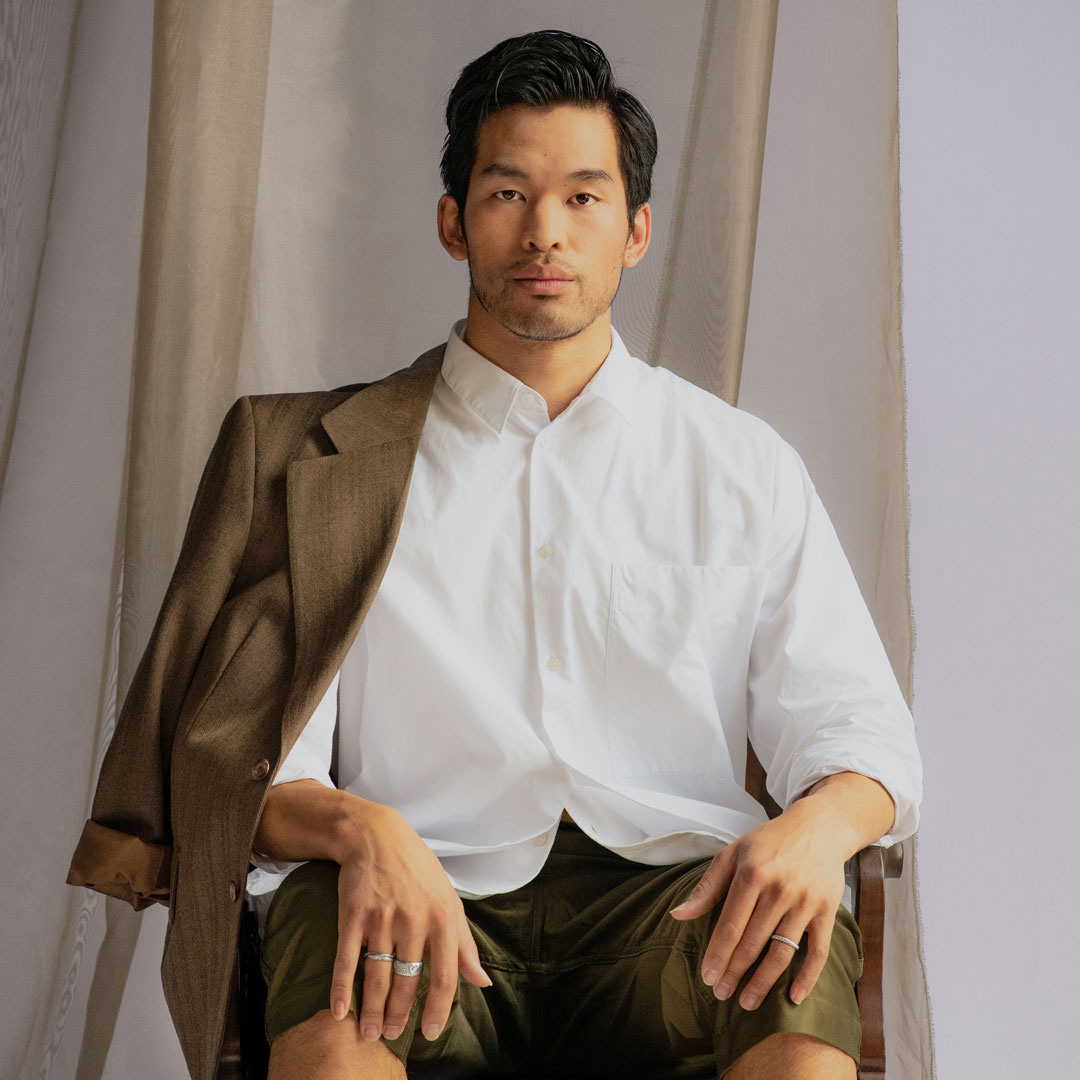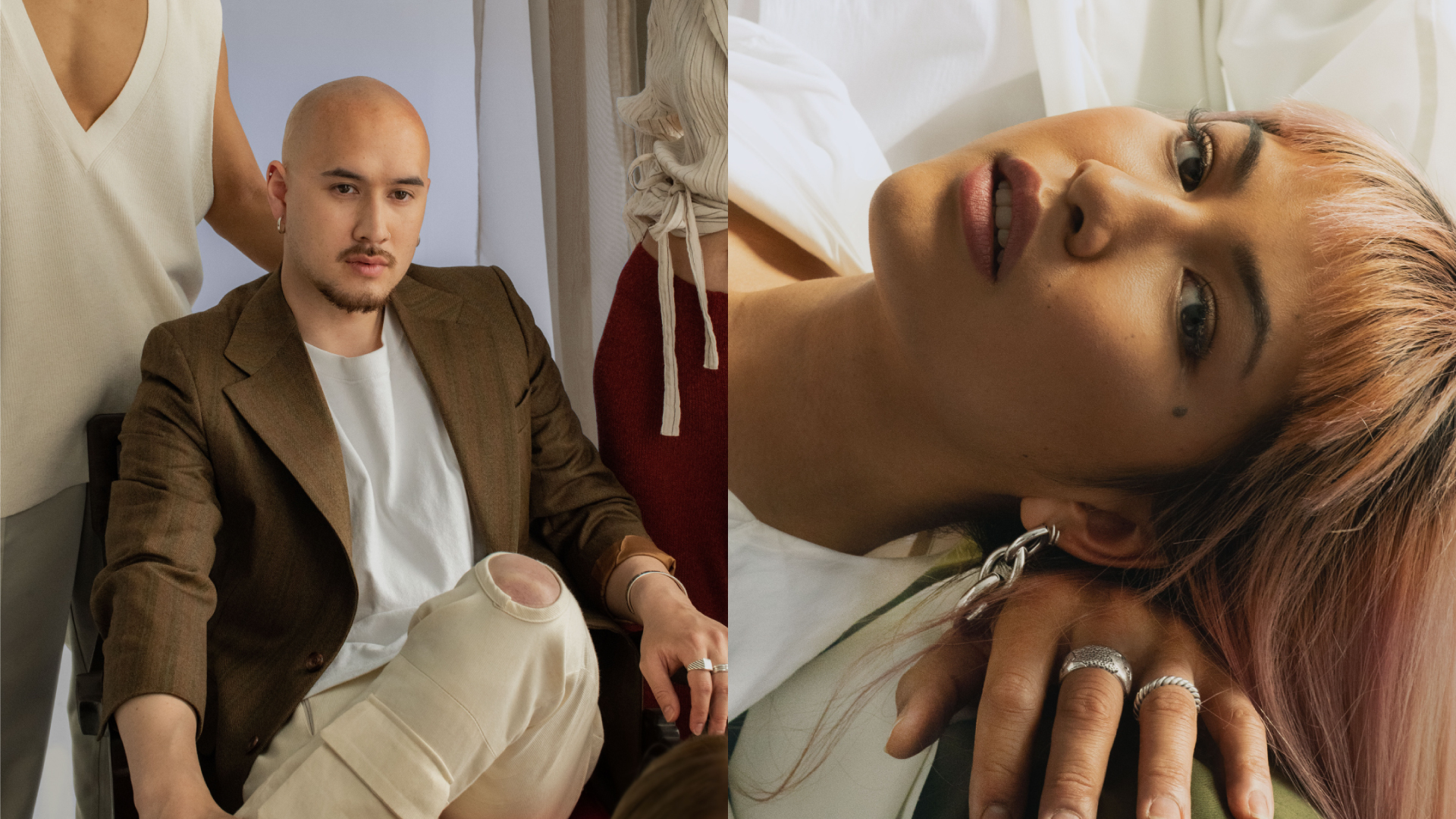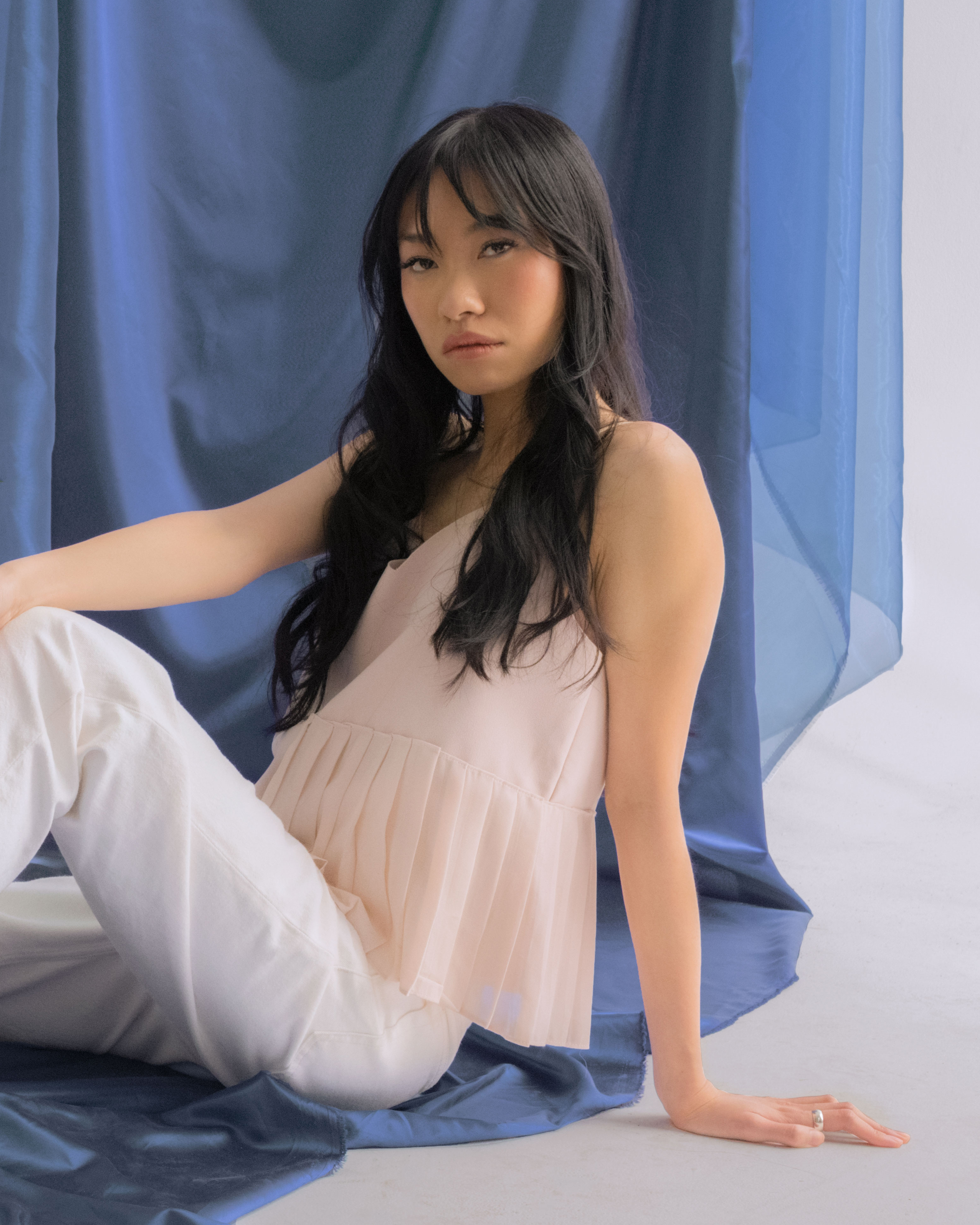Interview
CATCHING UP WITH FRIENDS
& FAMILY 1.0
May 20th, 2020
It was so much fun gathering different people from around the city to shoot our first issue’s cover picture. We took the opportunity to get to know them on a deeper level and to find out what there experience was like growing up in the ethnically diverse city of Montreal.

Dragon Chan Photos by Zach Phan; Photo Editing by Sara Thion; HMUA by Brit Phatal and Hue Ngnan; Styling by Samia Liamani; Prop Styling by Sarah Tu
Dragon Chan
@dragon.chan8
01/ Tell me a little bit about yourself.
My name is Dragon Chan. I have the privilege of being born and raised in Montreal, in the heart of the Mile End. I identify as Chinese, due to my heritage and family, and also as a French-Canadian with African cultural influences, which I owe to the ethnic diversity of the neighbourhood I grew up in. I’ve been a workaholic since I was born. OK, that may be an exaggeration. But I do think that I inherited a strong work ethic from my mom. I grew up working in my family’s various businesses in the Mile End. My mom still owns and operates a little flower shop on Bernard. This place was so essential in my upbringing. It largely shaped my character.
02/ Indeed, a lot of people may know you from your mother’s renowned flower shop, Dragon Flowers, on Bernard Street. How has she inspired you? |
My mom has played such an important role in each and every one of her fourteen kids' lives. She’s a role model of success and a kind human being. Her perseverance is undeniable – when we were kids, she would work 20 hours a day, make breakfast and pack lunch for each and every one of us and get us ready for school. Not forgetting that she raised fourteen kids on her own. As a teenager, I didn’t know how much that demanded from her. Looking back now, I think that everything she’s done required superhuman strength. She taught me to be responsible for my own decisions and that if I put enough perseverance in anything I do, it will eventually flourish. She always told me: “you either work hard or work harder’’.
03/ What are you working on at the moment?
|
I’m currently working on producing 5 film projects, one of which is the story of my mom!
04/ Can you tell us about your favorite movies growing up? |
I’m still trying to figure that out but I grew up watching a lot
of old Hong Kong cinema. I love action movies, to be honest and Bruce Lee has
always been more than just a film icon to me.
05/ If you could go back in time and teach your younger self a valuable lesson, what would you say? |
This question touches me deeply. If I were able
to time travel, I’d tell my younger self to be more curious and less serious.
 Left: Rémi Van Bochov
Left: Rémi Van Bochov
Right: Sophie Truong
Rémi
Van Bochove
@ray.anh.tuan
01/ Tell me a little bit about yourself.
My name is Rémi van Bochove, I was born and raised in Quebec City. I’m the second child of two wonderful immigrant parents. My mother is Vietnamese and my father is Belgian and Dutch. They met in Quebec City. Since my youngest age, I was always the curious type and wanted to be skilled in different domains. I once saw myself as an engineer and even an architect, so I ended up studying civil engineering at university. This didn’t work out for me. It was too square for me. I tried microbiology for two years at the same university but I had a hard time imagining myself in a laboratory for the next 30 years. I still value science but I needed more space for my creativity. I decided to trust my creative instinct and went into fashion studies in Montreal. I often have the feeling of being different in all the groups that I’ve been involved with: I was too geeky for sports, too creative for sciences, and in the fashion world, welll...I’m a straight guy.
02/ What does the word community mean to you? |
To me, community means support. It means
that you share references with a group of people without having to explain yourself. It
also means security, you have each others’ back like you do in an extended family. On the other
hand, it can also mean a box, a box with restrictions, rules or prejudices that
you are not always in agreement with. I’m always mindful of how one’s actions affects others and I tend to think from a group perspective rather than act alone.
03/ We featured some of your designs for the first issue’s photoshoot. Why is it important for you to take inspiration from Asian aesthetics? |
I'm highly influenced by my own experiences and my past. I grew up surrounded by so many pieces of art from different places around the world and from different times. They were mainly pieces from South-East Asia, Africa and the First Nations. I embody my ancestors’ stories, from my own perspective.
04/ Can science and arts find a middle ground? |
Without science, the materials can't evolve. I'm attached to the classics but I can't resist a touch of the future. Einstein was an artist.
Sophie Truong @kaothaisong
01/ Parlez-moi un peu de vous.
Je m’appelle Sophie Truong. Née à Paris, d’origine Franco-Thaïlandaise, j’ai déménagé à Montréal, ville que j’ai tellement détestée et que j’ai par la suite appris à aimer. Maintenant, je me sens chez moi nulle par ailleurs qu’ici. Montréal est tellement une ville inspirante et vivante. Il y a beau avoir du bon vin, de bons fromages et de bons croissants à Paris, il manquera toujours ce sentiment de liberté que je ne retrouve qu’ici.
02/ Quel est votre rapport avec vos parents? |
Le rapport avec mes parents est compliqué. Mon père est une personne autoritaire qui aurait voulu que je suive un chemin conventionnel. Lorsque j’ai décidé de suivre mes propores aspirations, il m'a renié. Je suis dans un perpétuel combat pour montrer à mes parents que la voie artistique que j'ai décidé de suivre est la bonne pour moi et que je ne suis heureuse qu’en la suivant. Je pense que la pression que j’ai vécue à cause de la différence culturelle entre mes parents et moi me donne envie d’apporter du changement pour la génération future, c’est-à-dire supporter les jeunes à poursuivre leurs rêves. Heureusement que ma tante, étant elle même dans un domaine artistique, m'a toujours supportée dans mes choix. C'est en autre grâce à son support ainsi que celui de mes proches que j'ai trouvé la force et le courage de me lancer dans cette voie.
03/ Tu travailles sur quoi présentement? |
Depuis que je suis petite, j'ai toujours été passionnée par les vêtements et mon rêve a toujours été de devenir une designer de mode. Toute ma vie, je n'ai jamais perdu cet objectif de vue. Je suis allé dans des voies qui n'ont absolument rien avoir avec la création, mais j’aime me dire qu'il a fallu que je passe par ces voies pour m'assurer que ce que je voulais faire c'était bel et bien de créer. Je pense que la vie est un processus. Depuis que je suis jeune je travaille sur l’oeuvre de ma vie : la création d’une marque de prêt à porter. Kaothaisong Species, sera une ligne Montréalaise qui empruntera une essence anticonformiste. Elle proposera des pièces confectionnées suivant des standards de qualité reconnue qui perpétuent d’ailleurs la tradition familiale de ma mère Iammarin Kaothaisong. Ma soeur travaille sur ce projet avec moi, et nous mettons un point d'honneur à façonnée dans des formes nouvelles mettant la relation avec le corps de la femme au coeur du sujet. Aussi, il est clair que nous puisons notre inspiration dans la musique électronique qui nous a fait basculer dans un monde parallèle et sans limite évoquant une vision spatiale.
04/ Nous voyons une montée de représentation asiatique dans l’industrie de la mode. Qu’en penses-tu? |
Je suis très heureuse et fière quand je vois que notre communauté est représentée dans le monde de la mode. J’en voit de plus en plus. Ça fait plaisir! J’espère continuer de voir notre communauté prendre plus d’espace dans toutes les sphères artistiques. J’espère moi-même pouvoir y contribuer.
05/ Si tu pouvais remonter le temps pour t’enseigner une leçon importante, que te dirais-tu? |
D’être patiente, de faire les choses bien à son rythme avec beaucoup de sérénité, et de ne surtout pas se précipiter pour finir un travail même si elle a tendance à être impatiente. Il vaut mieux prendre son temps, faire les choses bien que rapidement et de manière bâclée. Elle verra que les choses vont être beaucoup faciles. Aussi de ne pas se donner une trop grande pression et de toujours se rappeler avant tout que tout ce qu’on fait, on doit le faire pour le plaisir.

Lyly Ngo Le
Lyly Ngo Le
@lilingole
01/ Tell me a little bit about yourself.
My name is Lyly. I’m a professional resource coordinator in a law firm. I’m a foodie. I love to cook, to dance, and to be surrounded by my friends and family. My go-to shot: TEQUILA. I’m also an amateur sneakerhead and a BTS fan.
02/ What is your go-to answer when strangers ask you where you are from? |
I always say that I am a Quebecer of Vietnamese origin. I always find this question uncomfortable – I have difficulty fully identifying with either culture because I find myself somewhere in between. I felt as if my Quebecer side promoted open dialogue about how I felt on a day-to-day basis, whereas my Vietnamese side opted for more non-verbal demonstration of affection. I now know that I have the advantage of taking the best from both worlds. I’ve managed to embrace this duality that also comes with a constant search for belonging.
03/ What is something that you struggle with? |
My identity. I see myself juggling two cultures. I’ll never feel 100% Vietnamese, nor 100% Quebecer. But the older I grow, the more I realize that I have never been fully proud of my origins and the culture attached to it. I’ve neglected my roots and what hits me the most is that I lost at least 20% of my parents’ mother tongue. I’m thinking a lot about who I am becoming.
04/ You mentioned being a BTS fan. What does the influence of BTS in mainstream media mean to you? |
BTS is a movement, a phenomenon that represents Asians on an international scale. International music is much more accessible nowadays, and I think that is why BTS is getting recognition. I’m proud of them! There are also other groups out there. 88rising is a collective that signs other emerging Asian artists like Keith Ape, Rich Brian, and NIKI. They’re producing insane beats!

Miranda Chan
Miranda Chan @itsmirandachan
01/ Tell me a little bit about yourself.
My name is Miranda Choi-Ying Chan. I was born and raised in Montreal, Quebec. I am a graduate from École de danse contemporaine de Montréal and pursuing dance and movement direction professionally. I am also a model with Folio agency here in Montreal. I am someone who is infatuated with our bodies, our bodies in relationship to space and light and therefore I am also someone who functions and creates a lot visually. I like to think about our bodies as tools of communication and transportation through this world and enjoy nurturing it physically and mentally in order for it to be an instrument that can help the world be a bit better.
02/ What is something that you are working on right now?
Currently I am looking to do more movement direction, I am working on creating a short dance film and I am also developing a special project for Montreal dancers and creatives… Keep an eye out!
03/ What is like working in the dance industry for Asian dancers? |
In the dance industry, it can either be a pro or a con. Some choreographers envision something, but sometimes they simply don't see it on an "Asian body". Asian bodies can express something completely different from say a Caucasian body. We have our ancestry ingrained in our features. With the rising awareness of the importance of diverse representation, it has become easier for Asian dancers to be a part of castings for projects.
04/ What is the thing that you like the most about living in Montreal? |
I love that it is the perfect mix of Western and European culture and that most people know more than one language. I like how affordable rent is here and how depending on where you are in the city, you can feel like you are somewhere else! I definitely have learnt to appreciate being based in Montreal over the years.
05/ If you could go back in time and teach your younger self a valuable lesson, what would you tell her? |
I would teach her to be more vocal and communicative. It was something I always had trouble with and I do believe it can be linked culturally, as well as how sometimes as Asians we feel silenced in Western society. I would tell myself that I was not born to be average and to stop doubting myself! It is crazy how much time we spend doubting ourselves.
 Alvin Bado
Alvin BadoAlvin Bado
@abadhoe
01/ Tell me a little bit about yourself.
My name is Alvin, also known as Abadhoe on Instagram. I am currently part of a duo called LesParallèles. Driven by design and fashion, we produce content on YouTube and Instagram. Olivia and I created our brand based on our shared aesthetic perspective.
After graduating from CEGEP in Architectural Technology, I’ve been on sabbatical leave for 3 years now, and like many other people, I am still trying to figure out what I want to do for a living. Although I won’t be pursuing a job in the field I studied in, I’m glad that I narrowed down my options to either working in fashion or/and in design. Currently, I work at Aritzia, a women’s fashion boutique, as an inventory manager and I definitely see myself pursuing a career there.
After graduating from CEGEP in Architectural Technology, I’ve been on sabbatical leave for 3 years now, and like many other people, I am still trying to figure out what I want to do for a living. Although I won’t be pursuing a job in the field I studied in, I’m glad that I narrowed down my options to either working in fashion or/and in design. Currently, I work at Aritzia, a women’s fashion boutique, as an inventory manager and I definitely see myself pursuing a career there.
02/ Who were your role models growing up? How did they inspire you? |
My mom is the epitome of a hard-working person. Like many immigrants, she came here with no relatives and so little money. This woman works six days a week to provide food and a roof over our heads. She always puts our happiness before her own. My mom really does inspire me to get that bread. Hopefully, one day, I’ll make more money, so I can support her and so that she won’t have to work as much.
03/ How do you relate to your parents? Can you name one difference? |
Sometimes I feel disconnected from my parents’ culture because I am a victim of acculturation. As I grow older, I start to appreciate their culture more, enought to identify to it. I am currently trying to find the balance between my parents’ culture and my more Western lifestyle by cooking their Filipino recipes, paying more attention to their values and learning their native tongue. The only thing we don’t see eye to eye on is education. They grew up with the mentality that without a university diploma, you won’t go far in life. Whereas in our generation, depending on your career path, that piece of paper isn’t a necessity. That’s something they struggle with understanding but I can’t blame them because their intentions are pure. They only want what’s best for me.
04/ What is something that you are working on right now? |
I’m striving to become more compassionate and empathetic with people who surround me. We all go through hardships whether they be severe or minor, it should never be compared. We should understand first before making any assumptions. Just by having this kind of mindset, it makes you appreciate and relate to others more and it can definitely change the kind of energy we put out there. Also as much I love clothes, I try to buy less. Knowing that the fashion industry is one of the biggest polluting industries today, I thrift or purchase timeless items to be more sustainable and to reduce my carbon footprint.
05/ Is there anything else people should know about you? |
It hasn’t been too long since I came out of the closet and it’s probably one of the best and hardest things that I had to go through. In the environment I was raised in, always being compared to someone else’s “perfect” child, it was difficult for me to admit that I was gay and to accept my sexual preference. In my church, there was barely anyone I could look up to. If someone gay was acknowledged, it would be frowned upon. Therefore, I always kept quiet. I was concentrating on being the ideal child and not being a disappointment to my loved ones. It led me to lose sight of who I truly was and forgetting what made me happy. My breaking point was in CEGEP, where I created relationships with the most open-minded people. Even though they weren’t part of the LGBTQ community, they never judged me through any of my actions and just loved me for who I was. Also, I was less active at my church and that really helped me see that there was more to life. I still kept in touch with my church friends and, funny enough, I grew a stronger bond with them outside of the house of God. Having met more people that appreciated me for who I was made this process a lot smoother.
06/ If you could go back in time and teach your younger self a valuable lesson, what would you tell him? |
Step out of your comfort zone. You’ll get judged no matter what you do. My whole life until CEGEP, I was raised thinking your appearance was everything. For example, I couldn’t get my ears pierced because people would categorize me as a delinquent. Don’t worry about what people think about you, just do what you want to do as long as it doesn’t hurt others. It’s your image to choose and not theirs.
ABOUT THE PHOTOGRAPHER
Zach Phan is a Montreal-based photographer whose work focuses on empowering people of color and seeks to bridge sustainable relationship between art, commerce and society.








